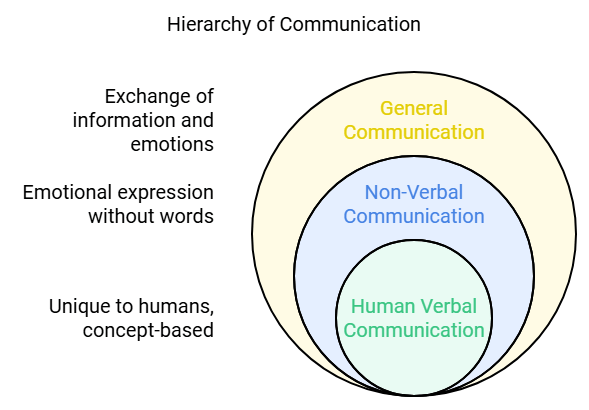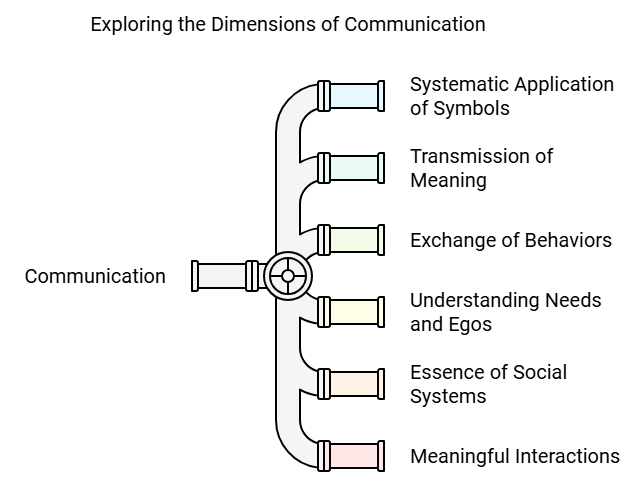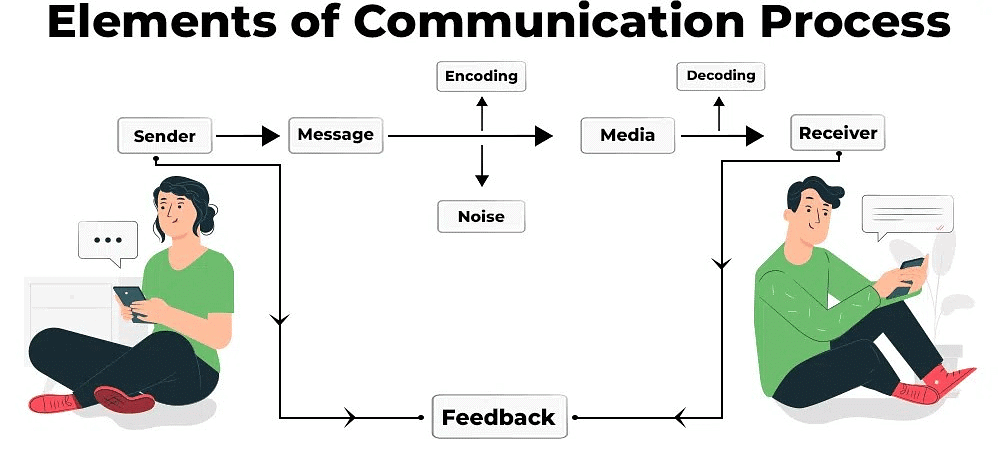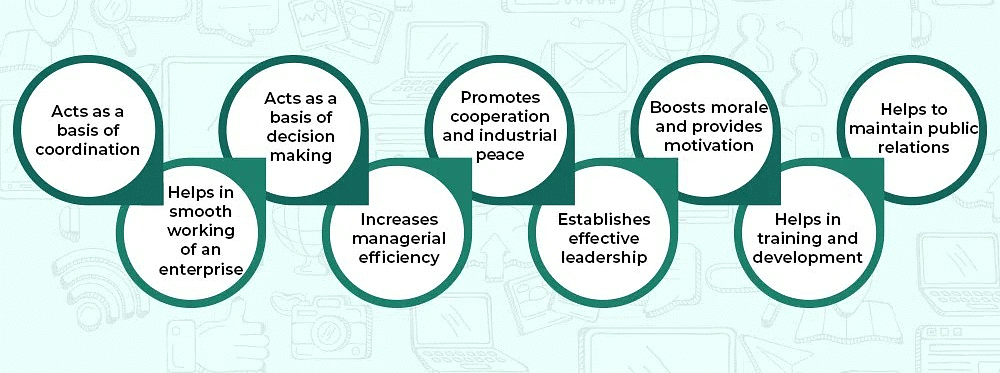Communication: Meaning & definitions - Communication Notes
Meaning
It’s nearly impossible to go through a day without the use of communication.
Communication is sending and receiving information between two or more people.

The person sending the message is referred to as the sender, while the person receiving the information is called the receiver.
The information conveyed can include facts, ideas, concepts, opinions, beliefs, attitudes, instructions and even emotions.
- Even animals also communicate. Usually, they communicate, through non-verbal means, they express their feelings, pain, pleasure, joy, sorrow, anger, pity and other emotions. But their language is silent.
- Besides silent languages, there is a special kind of language – verbal language. Verbal languages can be used by those who are able to form all sorts of concepts.
- Since only human beings are able to form all sorts of concepts, therefore verbal languages have been evolved from and confined only to humans.

Definitions
Generally we define communication as the process of transfer of information between two sources with the information being understood by both. Some remarkable definitions of communication are given below.
- “Communication is a field of knowledge dealing with the systematic application of symbols to acquire common information regarding an object or event.” -Kell
- “It is the transmission of commonly meaningful information. It is a process that involves the exchange of behaviours.” -Luther
- “Communication is the process of making a message understood by satisfying the need sets and ego sets of a receiver.” -A. Kumar
- “Communication – the exchange of information and the transmission of meaning – is the very essence of a social system or an organisation.” -Katz and Kahn
- “Communication is the process of meaningful interactions among human beings. It is a process by which, meanings are perceived and understandings are reached among human beings.” – Dr. McFarland
- “Communication is a process of transmitting ideas or thoughts from one person to another for the purpose of creating an understanding in the thinking of the person receiving communication.” – Brown
- “Communication is a dynamic process in which, man consciously or unconsciously affects the cognition of another through materials or agencies used in symbolic ways.” – Anderson
- “Communication is the process of sending and receiving messages.” – Sanborn
- “Communication is nevertheless an attempt at making common the basic condition for the origin, the existence, and the development of every social relationship.” – Fauconnier
- “It is a two-way process which cannot be adequately understood in terms of simple engineering or mechanical analogies. It is uniquely a human relationship from which, emerge all civilizations and culture without which, man as we know him, could not survive.” – Fearing

Elements of Communication
The process of communication involves the following steps:

- Sender: The individual initiating the communication process by conveying thoughts, messages, or ideas to the receiver. For instance, in a classroom setting, a teacher serves as the sender.
- Message: The content of the communication, encompassing ideas, emotions, instructions, or requests that the sender intends to communicate.
- Encoding: The conversion of messages into communication symbols such as words, images, gestures, or symbols that are understandable to the receiver. It involves translating the sender's thoughts into a comprehensible language.
- Media: The channel through which the encoded message is transmitted to the receiver, serving as the carrier of the communication. It can take various forms such as written communication, face-to-face interactions, or digital mediums like the internet.
- Decoding: The process in which the receiver interprets and translates the encoded message back into a form that can be understood. It involves deciphering the symbols used by the sender to comprehend the message.
- Receiver: The individual who receives the message from the sender. In a classroom scenario, students are the primary receivers of information.
- Feedback: Essential for effective communication, feedback involves the receiver responding to the sender's message. It ensures that the message has been received and understood correctly, closing the communication loop.
- Noise: Any interference or barrier that disrupts the communication process, leading to misunderstandings. Examples include disturbances in the communication channel, distractions, misinterpretations, or technical issues.
Importance of Communication
 Importance of Communication
Importance of Communication
- Acts as a Basis of Coordination: Communication is crucial in coordinating the activities of various departments within an organization. It facilitates the exchange of information, ideas, and facts, ensuring smooth coordination.
- Helps in Smooth Working of an Enterprise: Communication is fundamental for the functioning of an organization from its inception. It enables the seamless introduction of changes and ensures that organizational interactions proceed effectively.
- Acts as a Basis of Decision Making: Communication equips managers with the necessary information and ideas for effective planning and decision-making. It aids in problem analysis and decision dissemination to the relevant parties.
- Increases Managerial Efficiency: Efficient communication is essential for the swift performance of managerial functions. It enables managers to convey goals, instructions, allocate responsibilities, and evaluate performances effectively.
- Promotes Cooperation and Industrial Peace: Communication fosters cooperation and peace in the workplace by fostering understanding between superiors and subordinates. It helps in dispelling misunderstandings and maintaining trust and harmony within the organization.
- Establishes Effective Leadership: Effective communication is essential for guiding, inspiring, and motivating employees within an organization. Leaders must convey their ideas, thoughts, and suggestions effectively to ensure a cohesive work environment.
- Boosts Morale and Provides Motivation: The motivation and morale of employees are significantly influenced by the quality of the communication system in place.
- Helps in Training and Development: Communication plays a crucial role in the training and development of employees across all levels of management.
|
6 videos|26 docs|5 tests
|
FAQs on Communication: Meaning & definitions - Communication Notes
| 1. What is the meaning of communication? |  |
| 2. What are the key elements of communication? |  |
| 3. Why is communication important in our daily lives? |  |
| 4. What are some definitions of communication in different contexts? |  |
| 5. How can one improve their communication skills? |  |

















